white supremacy

People of all religions and political leanings are speaking up against the administration’s policy of taking children from parents — but that’s not enough. We also must challenge the ideology that produces these human indignities, the mindset that supports them, and the perverted theology that blesses them. Those things have been around from our country’s beginning.
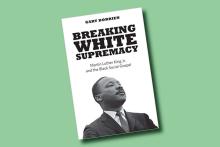
THE BLACK SOCIAL gospel is a critically important religious tradition—one that Gary Dorrien gives exquisite treatment in Breaking White Supremacy: Martin Luther King Jr. and the Black Social Gospel. This is the second installment of a two-volume series. The first, The New Abolition: W.E.B. Du Bois and the Black Social Gospel, won the prestigious Grawemeyer Award in Religion. The black social gospel, Dorrien explains, focuses not only on a political economy of justice—on matters including labor, land, and democratic use and ownership of capital—but also, unlike white social gospels, on racial equity.
Breaking White Supremacy explains the family tree of transformative religion that birthed Martin Luther King Jr.’s unique, but not unprecedented, practice of Christianity in Jim Crow America. Dorrien contends that mystic and author Howard Thurman, Morehouse College president Benjamin Mays, and Howard University president Mordecai Johnson provided examples of black Christian piety for King, which along with liberal theological education at seminaries in the northern region of the country shaped King to push America to become the social democracy it has never been.
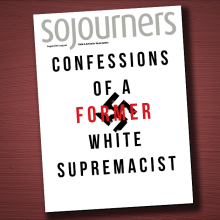
LOVING THY NEIGHBOR may be one of the greatest commandments, but loving thy enemies is surely the hardest. In the past few months, we’ve seen an outpouring of the former: crowds rallying at airports to welcome refugees; churches, cities, and campuses establishing sanctuary for undocumented immigrants; courageous bystanders intervening to protect strangers from harassment and violence.
But when it comes to loving the very people who have caused real harm to us and our neighbors—for example, peddlers of fake news, white nationalists, and members of certain presidential administrations—the crowd grows thin. And understandably so: Why should we extend love to those who perpetuate a politics of hate? What would loving those people even look like?
Former white nationalist Tony McAleer has an answer. As co-founder of Life After Hate, a nonprofit that helps people leave extremist groups, McAleer has seen how small gestures of compassion can transform those consumed by hate. So when McAleer met a young veteran inching toward anti-Islam extremism, he took him to meet a local imam. “It’s incredibly powerful to receive compassion from someone you’ve dehumanized,” McAleer tells Jason Byassee in our cover story.
Of course, loving your enemies does not mean condoning their actions. Neither does it mean a disregard for the safety or well-being of those who an enemy may harm, including ourselves. Yet even with these caveats, it’s impossible to domesticate Jesus’ commandment: Seeking restoration rather than retribution for those who do evil is truly radical. As Martin Luther King Jr. put it, nonviolent enemy-love forces us to recognize “that evildoers are also victims and are not evil people.” Try thinking about that the next time you see a sound bite of your least favorite politician.
Read Jason Byassee's profile of Tony McAleer, "Confessions of a Former White Supremacist," in the August 2017 issue.

WHAT VALUES WERE really at stake for the 81 percent of white evangelicals who voted for a presidential candidate who uses crass language and admits to engaging in coarse behavior, and whose campaign was marked by vitriolic hatred of various people, particularly people of color?
I raised this question with a white male leader of a Christian foundation. In response, he told me to consider the “moral values”—such as pro-life concerns—that he said prompted, if not demanded, white evangelical support of Donald Trump’s candidacy.
The Christian leader suggested that these particular concerns mitigated any misgivings that white evangelicals might have with Trump’s dissolute behaviors and bigoted views. For many others, the moral imperatives not to support Trump were more overriding, especially for those who prioritize personal virtue as a core religious value.
The “value proposition” displayed by white evangelicals in the 2016 election, and the definition of what constitutes “moral values” and what doesn’t, is inextricably related to the nation’s upcoming demographic shift—the fact that, by the year 2044, the United States is expected to become majority nonwhite. This has significant implications for the wider faith community regarding issues of race. Much more may be at stake than the leader of the Christian foundation was able or willing to recognize.
‘The new Israelites’
The value proposition of the Trump campaign was made clear in the campaign’s “Make America Great Again” vision. This mantra tapped into America’s defining Anglo-Saxon myth and revitalized the culture of white supremacy constructed to protect it.
The Anglo-Saxon myth was introduced to this country when America’s Pilgrim and Puritan forebears fled England, intent on carrying forth an Anglo-Saxon legacy they believed was compromised in English church and society with the Norman Conquest in 1066. These early Americans believed themselves descendants of an ancient Anglo-Saxon people, “free from the taint of intermarriages,” who uniquely possessed high moral values and an “instinctive love for freedom.”
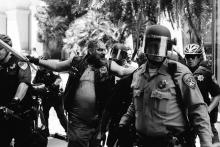
According to court documents, California Highway Patrol (CHP) worked with and expressed sympathy with the neo-Nazi Traditionalist Workers Party (TWP), treating them as victims and attempted to protect their identity.
7. How an American Ex-Jihadi Struggled to Rebuild His Life in the Country He’d Once Vowed to Destroy
In The New Republic, Tiffany Stanley does a deep dive into the life of Jesse Orton, who has been lifted up as the poster boy for the work of countering violent extremism: “Morton’s path to salvation seemed almost too good to be true. Could the transition from jihadi to patriot really be so seamless, so rapid, so complete? The answer to that question would, within months of Morton’s sudden burst of fame, become painfully clear. The answer was no.”
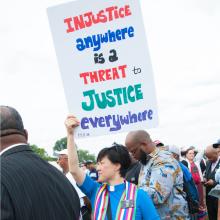
CERTAIN FORMS OF Christianity have long shared space with the political and nationalist Right in the United States. The history of white racist religion in the U.S. has also followed the line of a nativist ideology informed by a certain understanding of U.S. Protestant Christianity.
In the 1920s, the Ku Klux Klan sought to preserve Anglo-Protestant supremacy in the U.S.—especially in the face of immigrants from outside Western Europe. Later arose a particular form of racist ideology known as the “Christian Identity” movement, influential in racist organizations into the 1990s.
More recently, racialized Christian mythologies are no longer the dominant ideologies motivating white supremacists. Why has Christianity become problematic for white nationalists?
My own research reveals that Christianity is a problem for many American white nationalists because it is regarded by them as an ideology that weakens the allegedly natural instincts for racial preservation. The main objections to Christianity from contemporary white nationalists have been that 1) Christianity is of Jewish origins, and 2) that Christianity teaches, ultimately, values such as universal brotherhood of all people and the responsibility for everyone to care for one another. These are values that white nationalists have labeled “socialism” and ultimately alien to white racial nationalism.
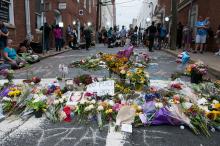
Scores of clergy have signed their names to statements opposing the white nationalist groups’ values. They have planned community prayer vigils celebrating diversity and advocating for unity. And, ahead of [the] Oct. 28 protest, they have sent a strong message that hate is not a religious value.

Of 1,131 active-duty service members, 30 percent surveyed that white nationalism poses a greater threat to U.S. national security than ISIS conflicts in Syria and Iraq, as additionally reported by Newsweek.

In the American church, where the right of the individual is sacrosanct, the ability to choose a church is protected with greater vigilance than the possible immoral consequences of that choice. The current segregation of congregations continues to be perpetrated and justified by the idolatry of choice.
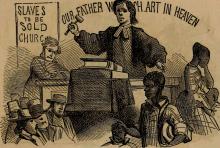
“THIS TIFFANY stained glass window was donated by parishioners in honor of Jefferson Davis,” said our guide, Barbara Holley. Holley is a member of the “history and reconciliation initiative” at St. Paul’s Episcopal Church in Richmond, Va. St. Paul’s, located across the street from the Virginia general assembly and around the corner from the Confederate White House, was called “the Cathedral of the Confederacy” for a reason. Fragments of stained glass honor Confederate President Jefferson Davis and Gen. Robert E. Lee. Both men gleaned inspiration, comfort, and resources for their cause here. Their pews are marked with commemorative plaques.
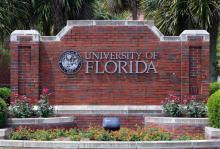
The three white nationalists, Tyler Tenbrink, William Fears, and Colton Fears, were charged with attempted homicide by Gainesville police.

“We request upon you to join with many other political and religious leaders to proclaim with one voice that the ‘alt-right’ is racist, evil, and antithetical to a well-ordered, peaceful society,” reads the letter first published by CNN.
The signers — including Southern Baptist Convention President Steve Gaines, former SBC President Fred Luter, and prominent African-American evangelical leaders T.D. Jakes and Tony Evans — reproach Trump for failing to speak out against the so-called alt-right.
“This movement has escaped your disapproval,” the letter reads.
Without naming names, it further states: “It concerned many of us when three people associated with the alt-right movement were given jobs in the White House.”
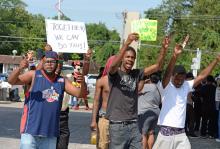
The test for religious leaders in this context has been nothing short of a demand for a prophetic voice which sees, names, and challenges the reality of a system that destroys the lives of some while parading as “law and order” for others. Faith leaders are finding themselves tangled in a quagmire of competing rhetoric about what makes for peace, walking the line of proclaiming prophetic vision amid a culture, a church, and a people tightly wrapped in the clutches of white supremacy.

If you went to church after Charlottesville, DACA, or the latest racial violence in your community, and were disappointed your pastor didn't speak, then it's time for you to act. Sitting and not liking what’s going on matters as much now as it did to stay in a segregated church back then. It’s time for you to find others in the congregation who are also disappointed. It’s time for you to go to your pastor and other leaders in the church. It’s time to insist he/she begin to speak justice — gospel — from the pulpit. (Pastors, it’s time for you to find those in your congregation who will stand with you as you do the same.)

It seems that the message people in the pews are hearing is deliberately divorced from Jesus’ values. Being a disciple no longer means sitting at Jesus’ feet, hearing his passionate, God-filled words, and trying to live them.

When asked about the tweet, Sanders replied, “I think that’s one of the more outrageous comments that anyone could make, and certainly something that I think is a fireable offense by ESPN.” There’s a revealing irony in this statement. I’m sure that Donald Trump and Sarah Huckabee Sanders do not think they are involved in white supremacy. I’m sure that they are not card-carrying members of any white supremacist group. But I’m also sure that they are unconsciously guided by white supremacy.
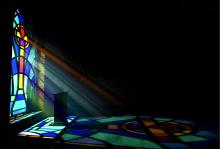
It’s my prayer that the loudest voice in the room will become the voice of sanity. That the voice is a collective voice that can only come from a gathering of people humbled before God’s love and not from a Facebook post gone viral. This is the greatest hope we have, that we are not alone and we can face each other with dignity and respect. This way of thinking shifts the focus of our faith from internal to external, from institutional to missional. To borrow from Dr. King, none of us know what will happen to us, but we’ve been to the mountaintop and seen what’s around the bend. It is costly grace that will lead us home, into the very heart of God in which we all dwell together. Cheap grace will divide us as the lure of acceptance without repentance turns us inward to only forgive and to sanction what is most familiar while rejecting those whom are cast outside our circle of care.
4. Houston Flooding Always Hits Poor, Non-White Neighborhoods Hardest
“You’re talking about a perfect storm of pollution, environmental racism, and health risks that are probably not going to be measured and assessed until decades later.”
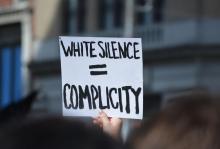
"Our faith is rooted in the incarnation, life, death, and resurrection of Jesus Christ, and his teachings claim authority in life and in death.
We reject as false doctrine any other claim on our lives—whether contrived of state or reason—that violates Jesus’ ethic of the equal and inestimable dignity of all people, each created in the very image of God and as such equally created with the divine call and capacity to sustain, protect, and serve the world."